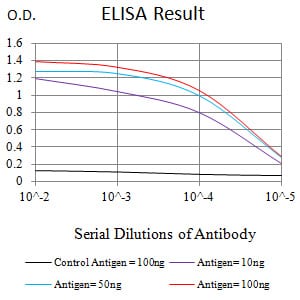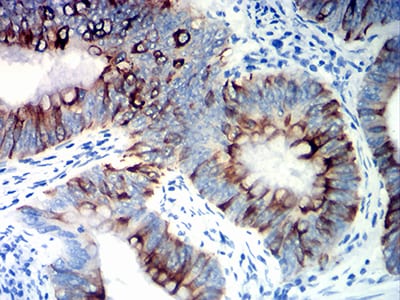

| WB | 咨询技术 | Human,Mouse,Rat |
| IF | 咨询技术 | Human,Mouse,Rat |
| IHC | 1/200 - 1/1000 | Human,Mouse,Rat |
| ICC | 技术咨询 | Human,Mouse,Rat |
| FCM | 咨询技术 | Human,Mouse,Rat |
| Elisa | 1/10000 | Human,Mouse,Rat |
| Aliases | KAP; Kdap; NAP1; NAPA; SNAPA |
| Entrez GeneID | 9476 |
| clone | 5A6E4 |
| WB Predicted band size | 45.4kDa |
| Host/Isotype | Mouse IgG1 |
| Antibody Type | Primary antibody |
| Storage | Store at 4°C short term. Aliquot and store at -20°C long term. Avoid freeze/thaw cycles. |
| Species Reactivity | Human |
| Immunogen | Synthesized peptide of human NAPSA (AA: KPIFVPLSNYRDVQYc). |
| Formulation | Purified antibody in PBS with 0.05% sodium azide |
+ +
以下是关于NAPSA(Napsin A)抗体的3篇参考文献,其名称、作者及摘要内容概括如下:
---
1. **文献名称**: *Napsin A as a reliable marker for lung adenocarcinoma in pleural effusions*
**作者**: Suzuki A, et al.
**摘要**: 研究验证了NAPSA抗体在胸腔积液免疫组化检测中的应用,表明其在肺腺癌与间皮瘤鉴别中的高敏感性和特异性,支持其作为肺腺癌诊断标志物。
2. **文献名称**: *Napsin A expression in renal cell carcinomas and its role in differential diagnosis*
**作者**: Lin F, et al.
**摘要**: 探讨NAPSA抗体在肾细胞癌中的表达模式,发现其在肾透明细胞癌中低表达,而在肺转移性腺癌中高表达,提示其在肿瘤起源鉴别中的价值。
3. **文献名称**: *Utility of Napsin A antibody in diagnosing ovarian clear cell carcinoma*
**作者**: Yoshida H, et al.
**摘要**: 研究发现NAPSA抗体在卵巢透明细胞癌中特异性表达,可用于与高级别浆液性癌的鉴别诊断,扩展了其在妇科肿瘤病理学中的应用。
---
注:NAPSA(Napsin A)常被用于肿瘤病理诊断,上述文献方向聚焦于其作为抗体在免疫组化中的诊断价值。若需具体文献链接或补充内容,可提供进一步信息。
The Napsin A antibody is a crucial tool in diagnostic pathology, primarily used to detect the presence of Napsin A (aspartic peptidase A), a protein encoded by the *NAPSA* gene. Napsin A is a protease involved in the maturation of surfactant protein B in pulmonary alveoli and is predominantly expressed in type II pneumocytes and renal tubular cells. Its expression is highly specific to lung and kidney tissues, making it a valuable biomarker for distinguishing primary lung adenocarcinomas from other malignancies.
In clinical practice, Napsin A antibodies are widely employed in immunohistochemistry (IHC) to confirm lung adenocarcinoma, often alongside thyroid transcription factor-1 (TTF-1), as both markers are co-expressed in most cases. This combination improves diagnostic accuracy, especially in differentiating pulmonary adenocarcinomas from squamous cell carcinomas or metastatic tumors. Additionally, Napsin A expression is occasionally observed in renal cell carcinomas, aiding in their identification.
The development of monoclonal Napsin A antibodies has enhanced specificity and reproducibility in staining, reducing cross-reactivity with other proteases. Research continues to explore its prognostic role and potential therapeutic applications, particularly in targeted therapies. However, variability in antibody sensitivity and interpretation requires standardized protocols to ensure diagnostic reliability. Overall, Napsin A antibodies remain indispensable in precision oncology and pathological diagnostics.
×